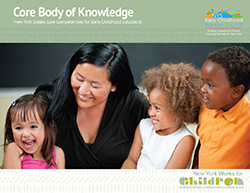
Core Body of Knowledge
New York State's Core Competencies for Early Childhood Educators

6.1
Resources for Competency 6.1:
1
click to view resource list
Ethical Standards
The professional working with young children uses and follows all relevant ethical standards and professional guidelines
Resources & Media for Understanding Competency 6.1
Behaviors & Skills
-
aMeets or exceeds the education and experience requirements needed for their position (teachers, caregivers and administrators), as applicable
-
bAdheres to relevant New York State and New York City regulatory licensing, certification and training requirements, as well as the requirements of funders (if applicable)
-
cObeys laws related to child abuse, the rights of children with disabilities, and school attendance
-
dRecognizes potentially unethical practices. Uses NAEYC's Code of Ethical Conduct to resolve ethical dilemmas. (Visit http://www.naeyc.org/positionstatements/ethical_conduct)
-
eUpholds standards of confidentiality, sensitivity and respect for children, families and colleagues
-
fUses relevant professional standards and guidelines to plan and implement experiences for young children and families
-
gRefers to NAEYC position statements to make thoughtful choices in their early childhood settings
-
hMaintains a developmentally and culturally appropriate environment and curriculum based on basic principles and theories of child growth and development
-
iCounters any teaching practices, curriculum approaches or materials that are degrading with regard to race, sexual orientation, family structure, gender, culture or religion
-
jResponsibly serves as part of an interdisciplinary team, including participation in IFSP/IEP meetings, according to DEC Recommended Practices

